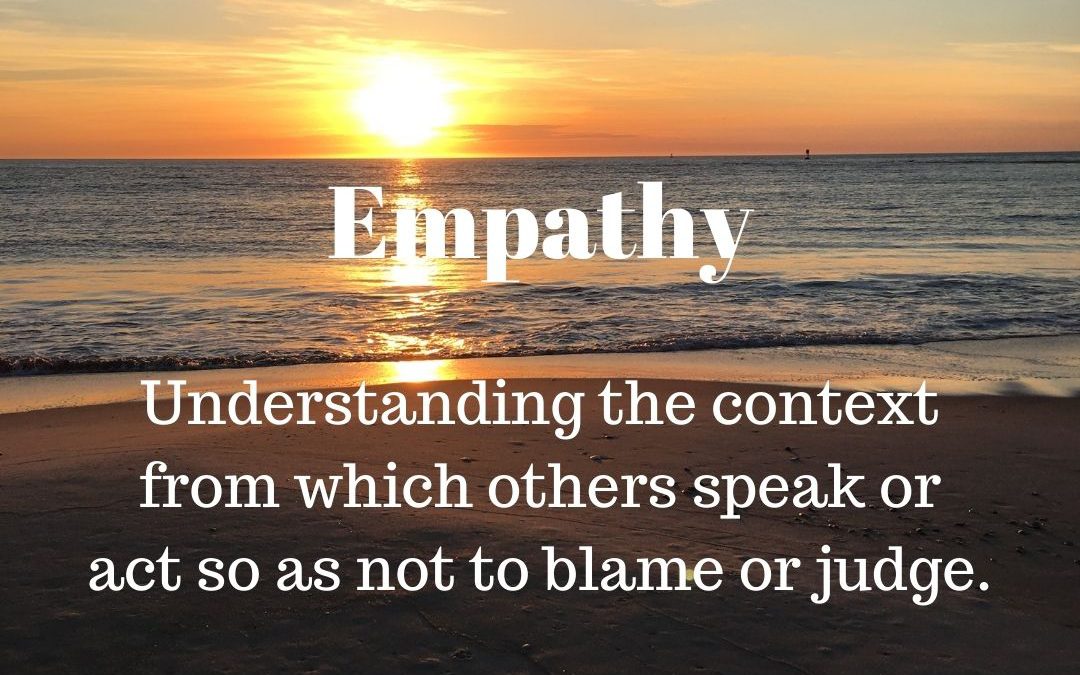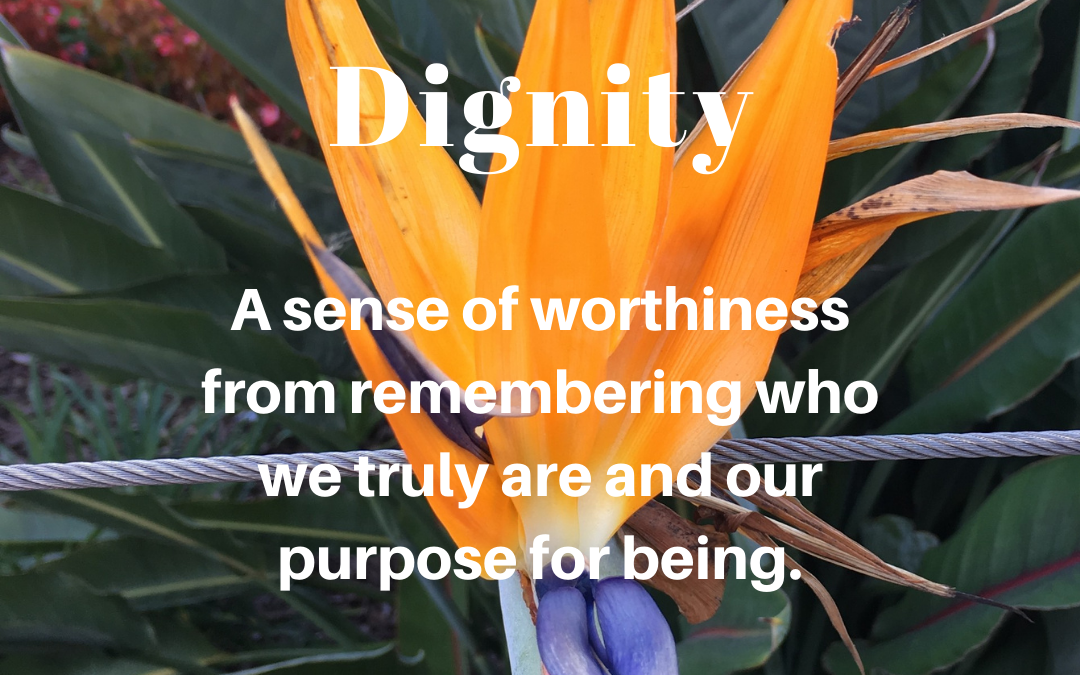
Empathy
Description
Empathy is the profound ability to step into another’s world and compassionately understand their experiences, thoughts, and emotions. It allows us to connect deeply with others, honoring their humanity and fostering a sense of shared understanding.
Through empathy, we listen to words and unspoken feelings, offering a safe space for others to explore their thoughts more clearly. This virtue transcends barriers, dismantling prejudice, blame, and judgment—those forces that divide us. Instead, it binds us together, reminding us of our shared humanity.
Empathy inspires us to consider the impact of our actions on others. It moves us toward fairness and justice, encouraging us to advocate for the dignity and well-being of every person, including those with whom we may not agree. By cultivating empathy, we nurture generosity and selflessness, building bridges where walls might otherwise stand.
At its heart, empathy is the thread that connects us all. It allows us to live with greater compassion, humility, and kindness, making it a guiding light for individuals and communities in all walks of life.
Affirmations for Empathy
1. I will listen to others without interrupting or judging.
Active listening creates space for understanding and shows respect for the other person’s feelings and experiences.
2. I will seek to understand before seeking to be understood.
Prioritizing the other person’s perspective helps foster connection and mutual respect.
3. I will imagine myself in their place to understand their feelings better.
Practicing perspective-taking nurtures compassion and reduces misunderstandings.
4. I will acknowledge the emotions of others, even when I do not fully agree with their perspective.
Validating emotions builds trust and strengthens relationships, even in moments of disagreement.
5. I will approach every conversation with curiosity and an open heart.
A curious mindset helps break down barriers and encourages deeper understanding.
6. I will ask, ‘How would I feel in their situation?’ before reacting.
This habit encourages thoughtful responses and reduces impulsive judgments.
7. I will practice patience when others express their thoughts and feelings.
Patience allows others the time and space to share, fostering a sense of safety and openness.
8. I will notice the emotions behind someone’s words and actions.
Paying attention to underlying feelings helps uncover unspoken needs and concerns.
9. I will remind myself that everyone is fighting a battle I cannot see.
Recognizing hidden struggles builds compassion and reduces blame or criticism.
10. I will be kind to myself as I practice empathy for others.
Self-compassion ensures that empathy comes from a place of balance and care, preventing burnout.
Quotes
“You never really understand a person until you consider things from his point of view… until you climb into his skin and walk around in it..” — Harper Lee, To Kill a Mockingbird
“Resolve to be tender with the young, compassionate with the aged, sympathetic with the striving, and tolerant with the weak and wrong. Sometime in your life, you will have been all of these.” — George Washington Carver
“When you show deep empathy toward others, their defensive energy decreases, and positive energy replaces it. That’s when you can get more creative in solving problems.” — Stephen Covey
Empathy In Family Life
Empathy in family life is the ability to connect deeply with each other’s feelings and experiences, creating a foundation of understanding, compassion, and unity. It allows parents and children to step into each other’s shoes, offering a safe space for emotions to be expressed and needs to be met.
For parents, empathy means truly listening to their children without judgment, acknowledging their emotions, and validating their unique perspectives. It involves guiding children to see the impact of their actions on others while modeling kindness, patience, and open communication. Empathy helps parents navigate conflicts with love, offering guidance that nurtures rather than shames.
For children, practicing empathy begins with recognizing and naming their own feelings, which lays the groundwork for understanding the emotions of others. Through empathetic interactions with family members, children learn to respond to others with care and compassion. They see firsthand how empathy strengthens relationships and builds trust.
Empathy in family life creates a nurturing environment where every member feels seen, heard, and valued. It transforms misunderstandings into opportunities for growth and deepens the bonds that make a family resilient, loving, and connected. By cultivating empathy, families become a haven of mutual support and understanding, a model of humanity at its best.
Balancing Empathy
Empathy, when in balance, serves as a powerful force for connection and understanding within families. It allows us to nurture relationships, respond to each other’s needs with compassion, and foster a deep sense of unity. However, to ensure empathy remains a positive force, it must be supported by other virtues that help balance and moderate its expression, preventing it from becoming overbearing or underdeveloped.
-
-
-
Discernment: Discernment helps us wisely assess when and how to offer empathy, ensuring it is appropriate and aligned with the needs of the situation.
-
Boundaries: The virtue of boundaries ensures that empathy does not lead to self-sacrifice or emotional burnout, allowing individuals to care for themselves as well as others.
-
Justice: Justice ensures that empathy is balanced with fairness, helping us make decisions that consider everyone’s needs and not just the most vocal or visible feelings.
-
Self-Discipline: Self-discipline allows us to temper our emotional responses, preventing us from becoming overly involved in others’ struggles to the detriment of our own well-being.
-
Detachment: Detachment fosters emotional clarity, enabling us to empathize without becoming overwhelmed by another’s emotions or losing our sense of self.
-
Courage: Courage supports empathy by empowering us to act on compassionate understanding, even when it requires difficult or uncomfortable choices.
-
Patience: Patience helps us respond empathetically without rushing to fix or solve problems, giving others the space to process their own emotions.
-
Honesty: Honesty balances empathy by encouraging truthful, constructive communication that respects both feelings and facts.
-
Gratitude: Gratitude helps us maintain a positive perspective, ensuring that empathy does not become a source of emotional heaviness or despair.
-
Humility: Humility reminds us that while empathy connects us, we cannot fully control or fix another person’s journey, fostering realistic expectations in relationships.
-
-
Maintaining a balance of virtues ensures that empathy remains a healthy and life-giving force in family life. By practicing complementary virtues such as boundaries, discernment, and humility, parents and children can experience the deep connection empathy offers without being overwhelmed. A well-rounded approach to virtues supports the emotional and relational well-being of everyone in the family, creating an environment where love and understanding can truly thrive.
Joe is a husband, father, grandfather, author, speaker, educator, course creator, and parent/family coach.
He helps parents develop unity, find clarity, communicate, and develop consistency in their parenting with the Four C’s of Successful Families. You can find his work on social media.
In addition, the Four C’s newsletter is enjoyed by many as it encourages parents to self-care, build their relationships with their partners, and raise their children.
And he loves to golf!




